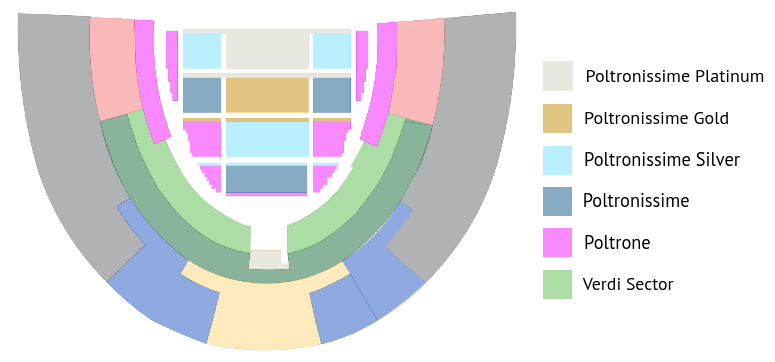
Rome
Vatican
Florence
Venice
Verona
Tickets for the 2025 Verona Opera Festival are now available, with a wide range of performances premiering with Nabucco on the 13th June and ending with Rigoletto on the 6th September.
Tosca, regularly part of the summer Verona opera season at the Arena di Verona, is an opera in three acts. Composed by Giacomo Puccini, the Italian libretto is by Luigi Illica and Giuseppe Giacosa, and was based on a play, La Tosca, by Victorien Sardou. It was first performed in Rome in 1900.
The time is Rome, the year 1800. The characters are Floria Tosca, an opera singer (soprano); Mario Cavaradossi, a painter (tenor); Baron Scarpia, chief of the Roman police (baritone); Cesare Angelotti, leader of the Republicans (bass); a Sacristan (baritone); Spoletta, a police agent (tenor); Sciarrone, Baron Scarpia's servant (bass); a shepherd boy (treble); a jailor (bass); the Chorus in made up of citizens, ladies, police agents, choirboys and soldiers.
Tosca is a superb opera of complex themes, with religion and politics at its heart. Giacomo Puccini was no conventional believer though, harbouring serious reservations about the Catholic Church. He was though, an Italian, and religion pervaded every area of Italian life. The Puccini family included several church musicians; as a youth, Puccini himself played the organ in Lucca Cathedral. And he had devout friends, including a number of priests. The Church though, harboured doubts about the composer, considering him a heretic.
Politics is the other strand in Tosca. Sardou's play weaves in the Battle of Marengo, Napoleon and Queen Caroline of Naples. Puccini and his librettists then spin a complex tale of religious belief played out against the dramatic political foment that shook 19th century Europe. Puccini composed lush melodies for the piece, drawing on the devotional music he knew (and indeed the sound of church bells chimes through the piece). The whole is underpinned by a dramatically strong story, with an enthralling plot.
In Act I, Angelotti (a political dissident) is on the run from the police and seeks refuge in his family church. His sister, the Marchesa Attavanti, has been praying here for her brother's freedom. Unknown to her, painter Mario Cavaradossi (an old friend of Angelotti) has used her as a model for his painting of Mary Magdalen. The painter takes a miniature from his pocket, (bearing a portrait of his lover, the singer Tosca) and compares her to the Marchesa. Tosca arrives, realises the painting is the Marchesa and angrily demands that it be made more like herself. The painter hurries Angelotti to a safe haven in his villa. The Sacristan arrives to tell of Napoleon's defeat at Marengo, but their celebrations are halted by the arrival of Scarpia (feared chief of police). Scarpia manipulates Tosca's jealousy, hinting at an affair between the Marchesa and Cavaradossi.
In Act II, Scarpia plans to trap the painter and have Tosca for himself. Police agent Spoletta arrives having failed to capture Angelotti but with Cavaradossi under arrest. Tosca knows that Scarpia was lying about the affair. When the painter is tortured, she reveals Angelotti's hiding place. Scarpia says he will spare Mario if Tosca will become his lover. He will then allow them both to escape Rome, but he must organise a mock execution to make it appear he has dealt with Mario. Spoletta then enters to say that Angelotti has committed suicide as he was about to be arrested. Tosca agrees to Scarpia's sexual demands, but as he comes towards her, she stabs and kills him.
In Act III Cavaradossi sits in prison, awaiting his execution. Tosca enters and tells him that Scarpia is dead, but that he has arranged this mock execution, after which the pair will escape Rome. The painter is led to the firing squad. They fire; Tosca congratulates Mario on his convincing play at death, but as the soldiers leave she realises that he has really perished. She jumps to her death from the ramparts of the castle.
Please note that an Agency handling fee per item will be added during checkout.
Seating key Tickets marked as Poltrone (reduced) are only available for visitors under 30 years old or over 65 years old. Please note that you may be asked for a document proving your age in order to enter. Click here for more information on ticket types for the Verona Arena > Seating > Tips & practicalities > About the Operas > Transport & arrival
![]() Click here to book your Opera and ticket type for the Verona Opera Festival (all)
Click here to book your Opera and ticket type for the Verona Opera Festival (all)
![]() Click here for information on ticket types, plus a seating plan for the Verona Arena
Click here for information on ticket types, plus a seating plan for the Verona Arena
3.7 stars out of 5 from 3 ratings.